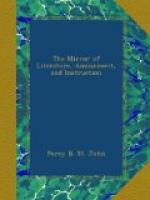Chorus.
“Lack-a-day, well-a-day!”
then let us sing,
And mourn for the loss of this good little
King.
His taste, for a monarch, was queer,
But his motto was “live
and let live, sir,”
He was thirsty, and fond of good beer,
Which his subjects were happy
to give, sir;
He levied his taxes himself,
A quart or a pint for his
dinner,
No exciseman went snacks in the pelf,
No clerks had this jolly old
sinner.
Chorus.
“Lack-a-day, well-a-day!”
then let us sing,
And mourn for the loss of this good little
King.
* * * * *
Except just by way of a lark,
His militia he never would
call out,
He then made them shoot at a mark
Till they had shot all their
powder and ball out.
Chorus.
“Lack-a-day, well-a-day!”
then let us sing,
And mourn for the loss of this good little
King.
To his neighbours he always was kind,
He never extended his boundaries,
For disputes and contentions, I find,
He never saw any just ground
arise:
Pleasure’s code being his statute
law
He ne’er caused a tear
to be shed, sir,
Though I swear not a dry eye I saw,
When his subjects first heard
he was dead, sir.
Chorus.
“Lack-a-day, well-a-day!”
well might they sing,
When they mourned the sad loss of their
good little King.
His portrait you must have observed,
In remarkably good preservation,
For his eminent virtues deserved
You’ll allow, a conspicuous
station:
“The King’s Head” still
continues his name,
Where full often the people
on holidays
As they tipple, still talk of his name,
In lamenting the end of his
jolly days.
Chorus.
“Lack a-day, well-a-day!”
thus do they sing.
And mourn for the loss of their good little
King.
H.
* * * * *
TO A LADY WHO SAID SHE WAS THE SAME AGE AS HIMSELF.
From the French of Beranger.
(For the Mirror.)
Our ages are the same, you say,
But know that love believes
it not;
The Fates, a wager I would lay,
Our tangled threads shared
out by lot;
What part to each they did assign
The world, fair dame, can
plainly see;
The Spring and Summer days were thine,
Autumn and Winter came to
me. H.
* * * * *
ENGLISH BALLAD SINGING.
(For the Mirror.)
The minstrels were once a great and flourishing body in England; but their dignity being interwoven with the illusory splendour of feudal institutions, declined on the advance of moral cultivation: they became in time vulgar mountebanks and jugglers, and in the reign of Elizabeth were suppressed as rogues and vagabonds. Banished from the highways they betook themselves to alehouses—followed the trade of pipers and fiddlers—and minstrelsy was no longer known in England.




